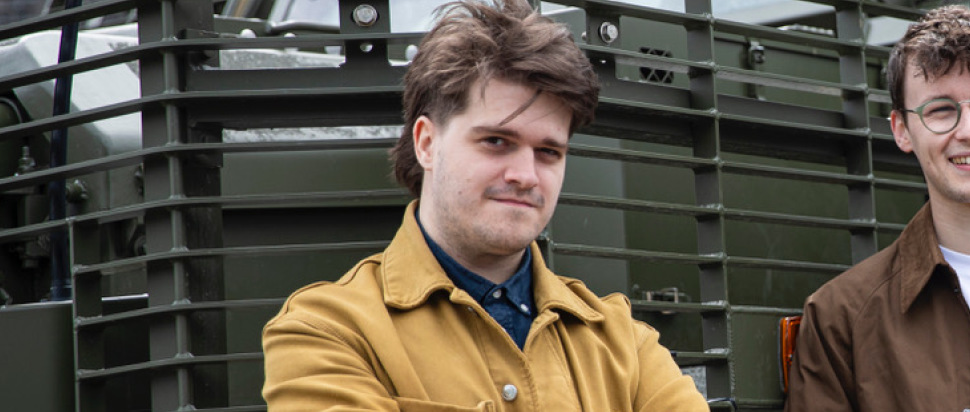Jack MacGregor on Everything Under The Sun
We meet award-winning Highlands playwright and director Jack MacGregor to discuss his upcoming drama Everything Under The Sun
Jack MacGregor is a fresh and future-facing talent who walks the line between sci-fi and contemporary history through provocative storytelling. The highly anticipated political narrative, Everything Under The Sun delves into imperialism, peace, and the contested values of global institutions. A drama born from the heart of one of the deadliest UN peacekeeping missions in history – the war in Mali. Ultimately, this is a play about peace – and what it means to keep it.
The Skinny: I’m interested in how this commission came to be, would you be happy to share the origin story of the work?
Jack MacGregor: After Nightlands at Summerhall last year, I wanted to explore new themes and places. I started writing before I was even contacted for the commission. I was drawn to Northern Mali as a space for drama; the epicentre of a truly international peacekeeping mission. The whole world contained within one country, that was the hook for me.
How was your relationship with commissioner Army@TheFringe when writing critically about military operations? I'm wondering how you have tackled the politics of the relationship while maintaining the integrity of the piece?
It’s something you have to confront head-on. Ask questions of any institution, even if they’re commissioning you. What I will say is that I have had the same process of writing this play as any other. At no point did anyone say “you can’t write that” – the play doesn’t pull any punches. Army@TheFringe allowed me to interview service members, some served in Mali, or were involved in the United Nations more broadly. The shadow of Iraq and Afghanistan frames British understanding of the deployment in Mali, that’s a big part of the story.
As a white person from Inverness, what brought you to tell this story? What aspects of yourself lives through the narrative?
This is something that needs direct chat... I am exactly that: a white person writing about a place I am not from. I do not write to offer solutions, I’m not that guy. I understand where my voice is helpful and where it isn’t. What I will say is that there is a narrative vacuum around the MINUSMA (United Nations Multidimensional Integrated Stabilization Mission in Mali), it isn’t being discussed in the English-speaking world, the only major coverage is through the French lens and that’s not great given they once controlled Mali as a colony. Mali has been devastated by colonialist economic structures, it’s important that dramas critique this because it is ongoing. We are connected to this.
As a writer from the North of Scotland, I have a fondness for peripheral places – and understand that these places are never peripheral to the people that live there.
What do you think the role of the arts are in addressing global socio-political issues?
Theatre is the last form of the living idea. In a political landscape as weird as Britain’s, the patient empathy of theatre invites genuine interrogation of our values, our histories and present injustices.
The military situation in Mali has shifted during the development of the work, making this a very timely piece of theatre. Can you tell us about your experience working with such a live situation?
This is the trick with writing about something that’s ongoing, it’s like trying to sketch lightning. When writing Nightlands, which was first drafted in 2020, Putin’s invasion of Ukraine was still confined to Donbas and Crimea. By 2022 the world was a different place.
It’s useless trying to future-proof your writing. My hope is that people will see a story that feels human. I don’t write to explain the intricacies of the Malian Civil War, it isn’t that. It’s a story about a young guy called Ibrihim (Thierry Mabonga) who is a translator with the UN. It’s a play that also goes deep into PMC Wagner’s operations in Africa; Mali is a confluence of competing imperialists, old and new.
It’s not a play about the British Army, rather the collective peacekeeping structure that Britain and the rest of the world contribute forces to. How do we keep peace? What is the future of peacekeeping in a world like ours?
What does peace mean to you?
Feeling safe in the present and having hope for the future. It’s more than just an absence of violence.
Do you have any future projects on the horizon that we should keep an eye out for?
I’m actually looking for new projects. If anyone wants to talk leads then find me on Twitter or write me an email, I’d love to hear from you. A theatre in Zurich is putting on a production of Nightlands so I’ll be there in September. First international work, I’m dead excited!
Everything Under the Sun, Army @ The Fringe, Drill Hall, 4-27 Aug (not 7, 14, 21), 6.45pm
This article was produced as part of Diverse Critics, a talent development programme for disabled and/or Black and people of colour arts writers delivered in partnership between Disability Arts Online and The Skinny and supported by The National Lottery through Creative Scotland
